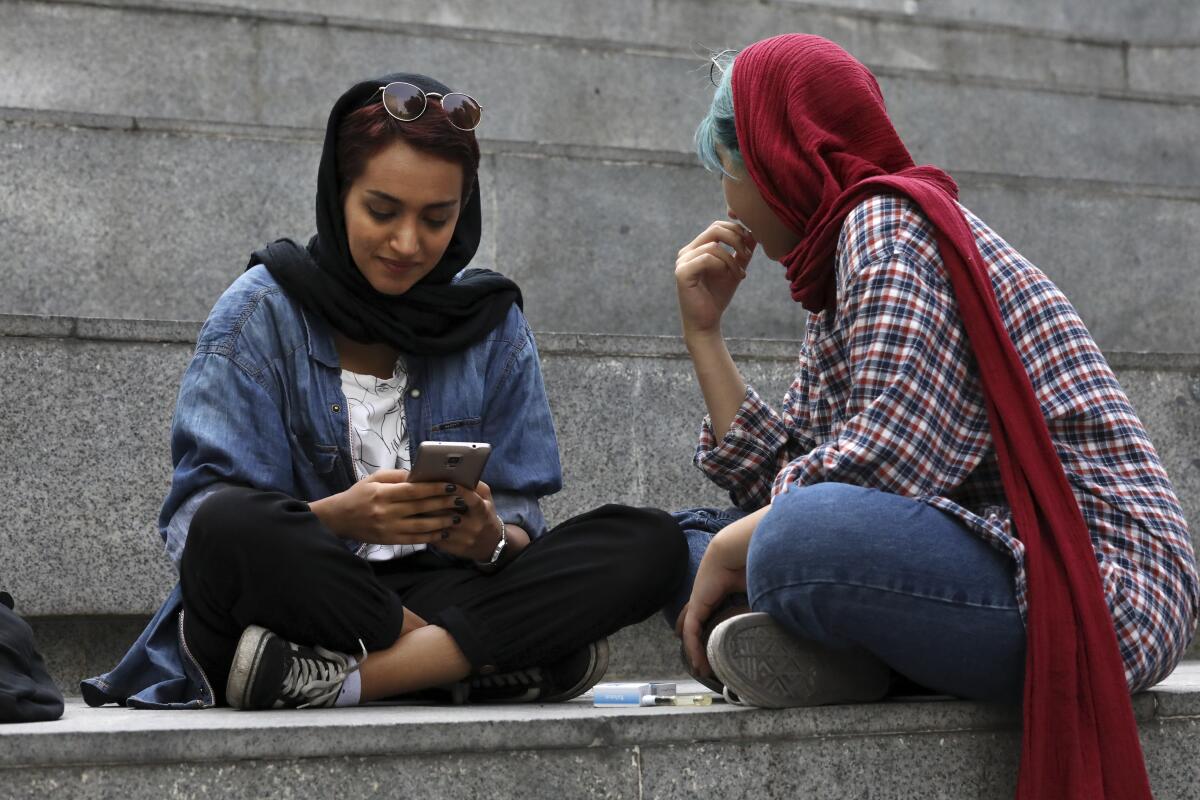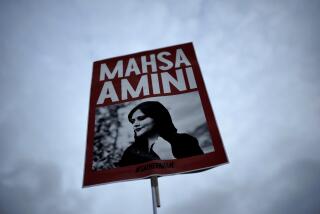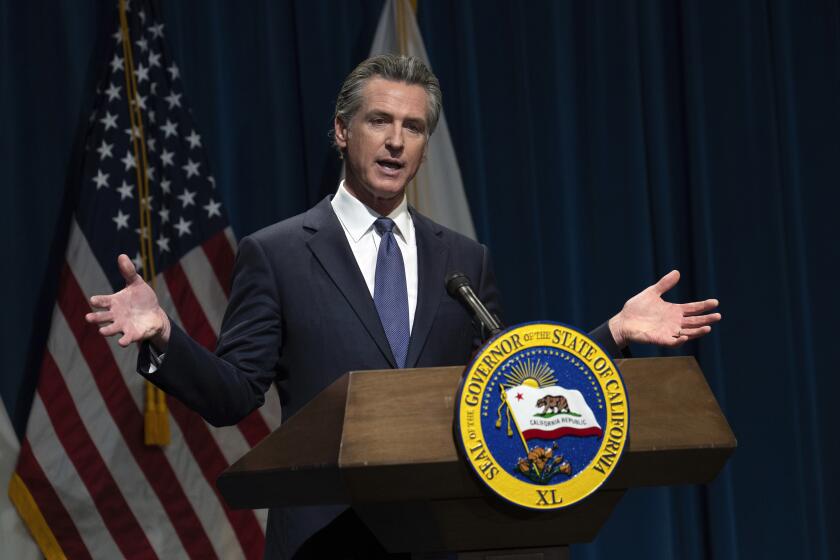Amid pandemic, Iran doubles down on social media ‘modesty,’ arrests hundreds

Reihane Taravati, a Tehran resident, knows all too well the dangers involved in posting videos and photos on social media sites in Iran.
The 29-year-old social media influencer has been arrested twice in recent years for uploading what authorities claim to be inappropriate content to YouTube and Instagram.
In 2014, Taravati received a suspended jail sentence for posting a video on YouTube of herself and a few friends dancing to Pharrell Williams’ feel-good hit “Happy.” They were part of a wave of young people in the Islamic Republic who had joined a worldwide movement of youths making videos of themselves dancing to the catchy tune. In some of the videos, the women wore headscarves toward the back of their heads, revealing some hair in the front.
She was arrested again last June for posting photos on Instagram that showed her without a headscarf, again breaking Iran’s modesty laws that require women to cover their hair. She was released soon after and received another suspended jail sentence.
Now, as more people go online while sheltering at home in the midst of Iran’s second wave of the coronavirus, women such as Taravati are concerned that they may be punished for recent content on Instagram and other social media websites.
“I’m worried that they may arrest me again,” she told the Los Angeles Times.
Taravati has been posting photos of herself without a headscarf and workout videos on Instagram. “During the quarantine period, my activities on Instagram tripled,” she said. “And my followers’ numbers have jumped lately as well.”
Since 2009, Iranian women have been required by the Computer Crimes Law to adhere to strict guidelines for online conduct, which includes what they can wear. But in the years since, authorities have been inconsistent in defining what constitutes “deviant” online behavior and also in enforcing their rules.
In May, Iranian Cyber Police Chief Turaj Kazemi told the state-run Asre Pouya news agency that women violated Iran’s cyber laws if they appeared on social media without a headscarf.
That officials are now doubling down on the rules reflects the Islamic Republic’s latest tactic in an ongoing battle in which hard-line, conservative Islamic clerics seek to reduce the influence of “Western culture.” Most citizens yearn for Iran to join the global stage more than four decades after the revolution that turned it into a strict Islamic theocracy.
Human right activists estimate that more than 250 Iranians have been arrested in recent months for posting photos on Instagram that are said to violate the requirement that women cover their hair.
In the last week alone, at least half a dozen people in cities across Iran were arrested for violating the social media law.
Five were detained in Hormozgan, a southern province, for “publishing pictures of a young couple’s wedding party on their Instagram account,” according to a statement made by Col. Saeed Shafiei, the social deputy of the law enforcement agency in Hormozgan.
On June 3, several people in the northeastern religious city of Mashhad were arrested for posting pictures that authorities described as “vulgar and norm-breaking” on an Instagram account with more than 700,000 followers, according to the semiofficial Fars News Agency.
With more people taking to social media since March, the crackdown has left more Iranians vulnerable to governmental whims.
“It is ridiculous that at the time of spreading coronavirus in the country their priority is our hijab on Instagram,” Taravati said.
Even well-known actors and athletes are not immune.
In May, an Iranian parkour athlete — a sport that involves jumping from high-rise buildings and hanging off cliffs — wound up in jail after he shared a photo of himself kissing a woman on a rooftop. The Instagram post by Alireza Japalaghy was captioned “Tehran dawn.”
The arrest warrant was issued by judiciary officials in mid-May after the image went viral. The pair were accused of “advocating vice,” according to the news agency Tasnim.
“There is no difference between crimes in the real world and those on cyberspace,” Ramin Pashaei, social deputy of Iran’s Cyber Police, told Borna news agency recently.
About 63 million Iranians have an Instagram account, according to Reza Misaghi, chief executive at the Tehran-based tech company Showrand. Misaghi said the number of Iranians using Instagram during the early days of the nation’s coronavirus lockdown increased by about 31%. He added that some users increased their use by 400% and that the most popular posters were often women.
“The Instagram market provides many opportunities for Iranian women in various aspects,” Misaghi said. “Many female influencers make money from their accounts.”
In September 2014, Taravati, sentenced along with five others, received a suspended sentence of 12 months in prison and 91 lashes.
Although it isn’t illegal to sing and dance in private in Iran, men and especially women are typically barred from doing so in public. Such activities, according to conservatives, run contrary to Islamic ideals for modesty in behavior and attire.
Sahar Mohammad, a 32-year-old singer, was jailed for posting a video clip on Instagram of herself singing. “There is no opportunity for Iranian female singers to work with companies, and we have many obstacles to show our art. In this regard, Instagram has provided this opportunity to us,” Mohammad said.
“About five years ago, our band published some songs. For that, we appeared before a court and then were banned for what they called breaking the taboo.”
Some Iranian female influencers working in fashion and beauty have left Iran after being banned from any activity on Instagram.
“I have not posted any photo not having my hijab on, but many Instagrammers including a few of my friends are under pressure for the hijab-less photos they have posted,” says Parisa Pourtaherian, a 29-year-old sports photographer with 25,000 followers on Instagram.
“I’ve been obsessed with millions of questions lately. Iranian females are not allowed access to stadiums, and our phones and social media accounts are monitored,” she said. “They sneak into every bit of our lives. I have no idea what is going to happen to us.”
Times staff writer Etehad reported from Los Angeles. A special correspondent in Tehran contributed to this report.
More to Read
Start your day right
Sign up for Essential California for news, features and recommendations from the L.A. Times and beyond in your inbox six days a week.
You may occasionally receive promotional content from the Los Angeles Times.







